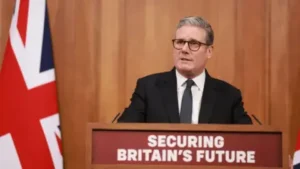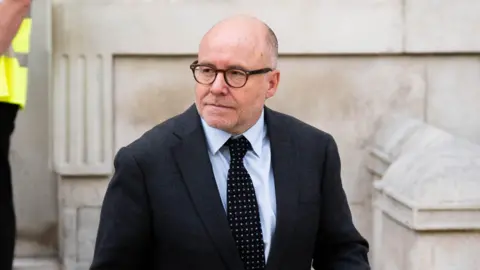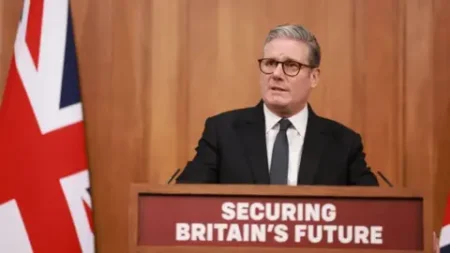In a recent interview, Lord Richard Hermer, the Attorney General of the United Kingdom, vehemently refuted claims that the nation operates a two-tier justice system, labeling such assertions as “disgusting” and “wrong.” This statement came in the aftermath of significant unrest, particularly following the riots of summer 2024, during which accusations arose regarding the perceived unequal treatment of rioters compared to protesters. Lord Hermer, who serves as the chief legal adviser to the government, emphasized the importance of maintaining public trust in the legal system, cautioning against the political ramifications of using incendiary terms like “two-tier.”
In his interview with the BBC, Hermer expressed concern over politicians perpetuating the notion of a two-tier justice system, highlighting the risks posed to the UK’s judicial integrity. He stated that comparisons made between violent criminal acts, such as those committed against law enforcement during riots, and peaceful protests trivialize the severity of the crimes involved. Hermer focused on the gravity of the situation, asserting that while protests can evoke varied opinions regarding their legitimacy, they do not warrant the same level of scrutiny as acts of violence against public officials.
Furthermore, Lord Hermer underscored the professionalism and dedication of law enforcement and judicial officers. He articulated that framing the justice system as two-tiered not only discredits the hard work of police and prosecutors but also undermines the principles of an independent judiciary. He urged the public to rally behind the justice system, instead of fostering a narrative that could potentially destabilize it.
The debate surrounding the alleged two-tier system escalated after the summer riots, with critics arguing that hardened sentences issued to rioters were inconsistent with the leniency shown to other groups, particularly those involved in protests. This discourse became politicized, catching fire within right-leaning circles, including members of the Conservative Party and Reform UK. They suggest that the government’s approach to sentencing reflects a disparity that cannot be ignored.
Despite initially lacking a prominent public profile, Lord Hermer has risen to prominence within the cabinet since his unexpected appointment as Attorney General. His past as a human rights lawyer, alongside his connections with high-profile political figures like Sir Keir Starmer, have placed him squarely in the crosshairs of criticism. These associations have led to allegations from political opponents who accuse him of having ties to individuals or groups with contentious reputations.
In this context, Conservative shadow justice secretary Robert Jenrick has vocally called for Hermer’s dismissal, highlighting that some of his clients have included controversial figures. In defense, Hermer responded to Jenrick’s remarks by asserting that his duty as a lawyer is to represent all clients fairly, irrespective of their political beliefs. He maintained that such representation is fundamental to the functioning of a just society, likening it to the work of doctors or journalists who interact with a diverse range of individuals.
Additionally, he addressed the perception that he leans towards the left politically, clarifying that he considers himself a pragmatic individual rooted in a progressive ideology. As discourse regarding the justice system continues to spark debate, Lord Hermer remains firm in his belief that the UK’s legal framework is strong and effective, urging all involved parties to contribute constructively rather than detract from its credibility.
In summary, Lord Richard Hermer’s remarks add significant weight to the ongoing conversation about justice in the UK, reiterating the importance of a unified legal system amidst rising tensions between public sentiment and political narratives.











